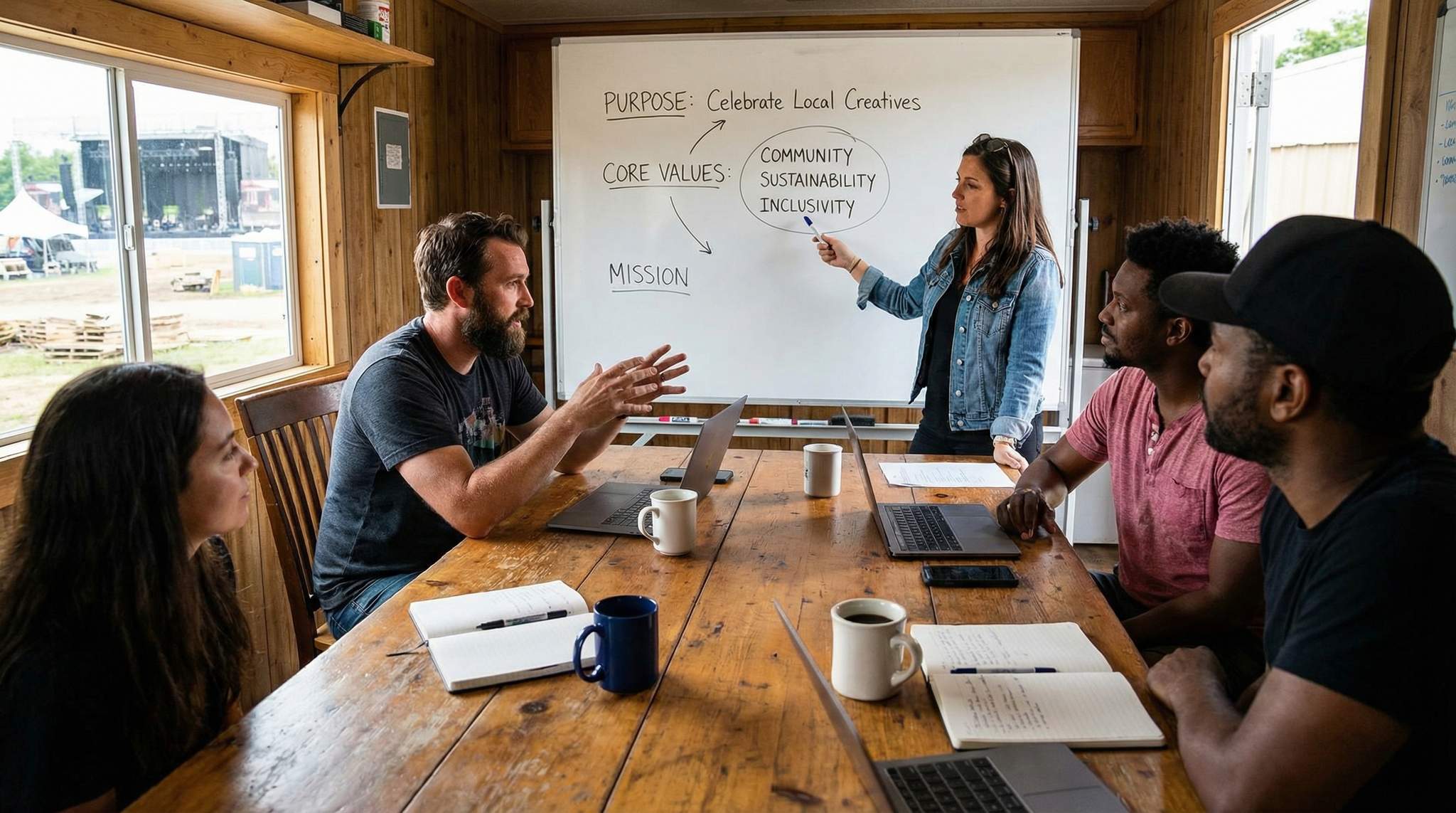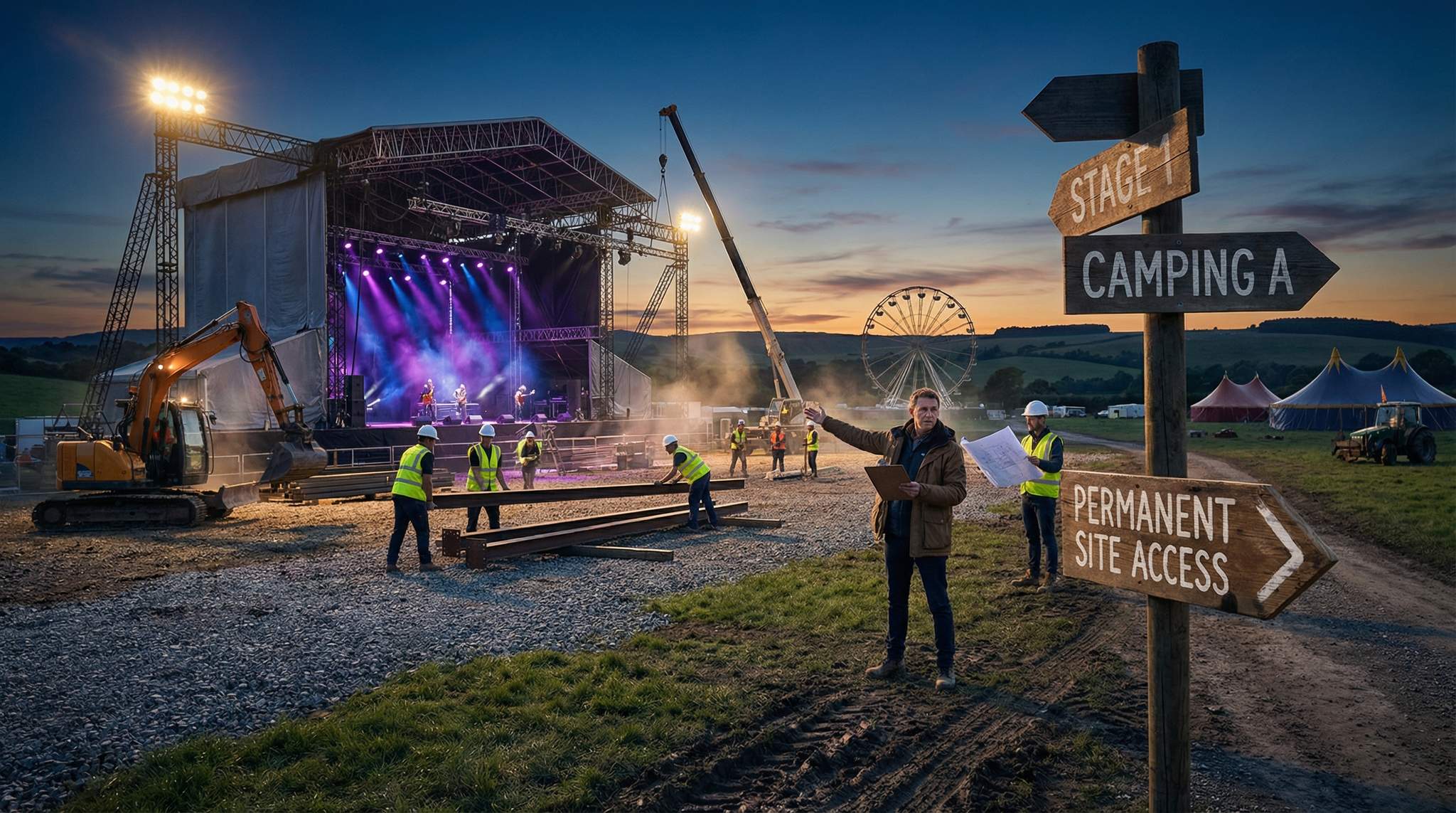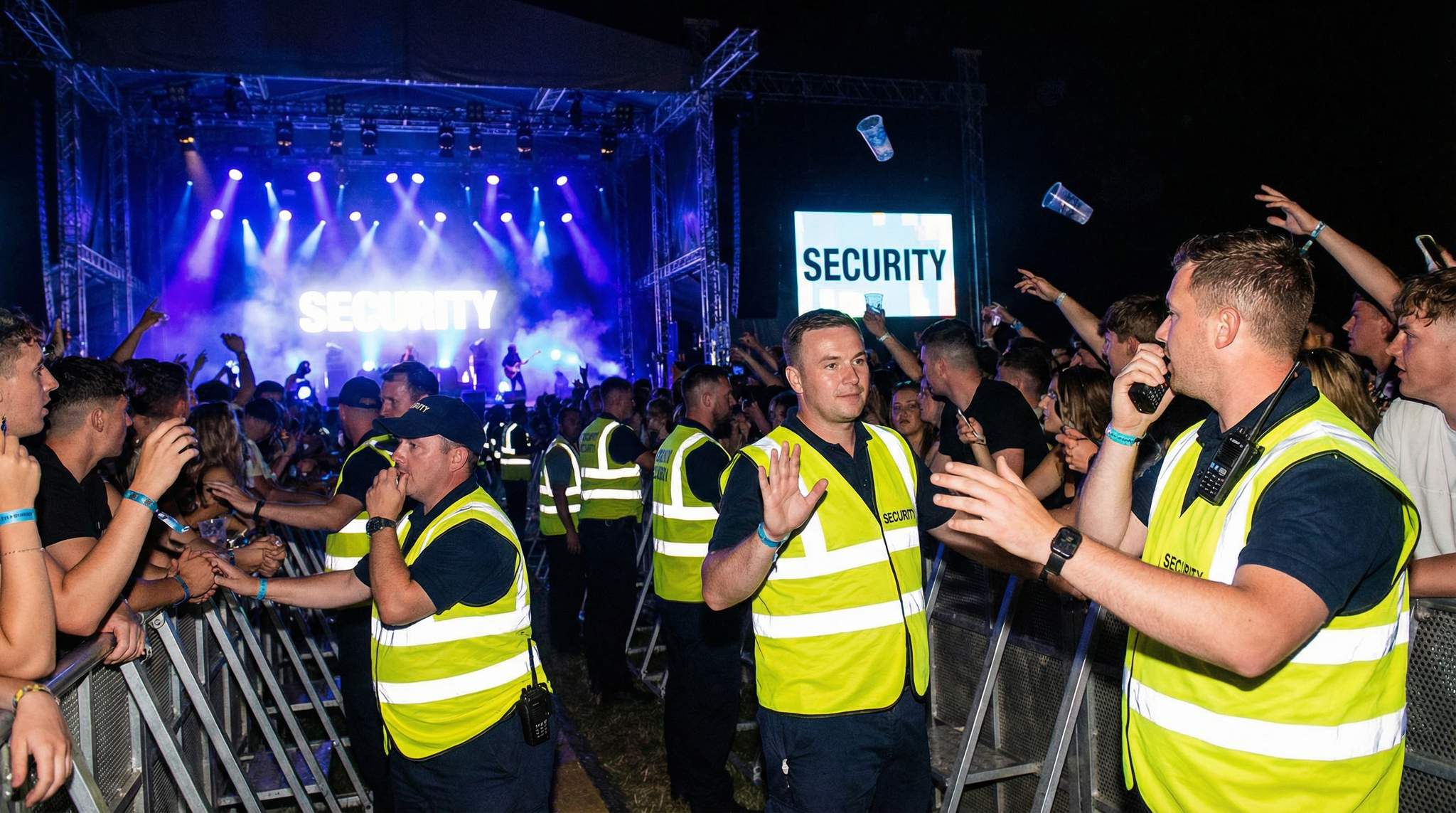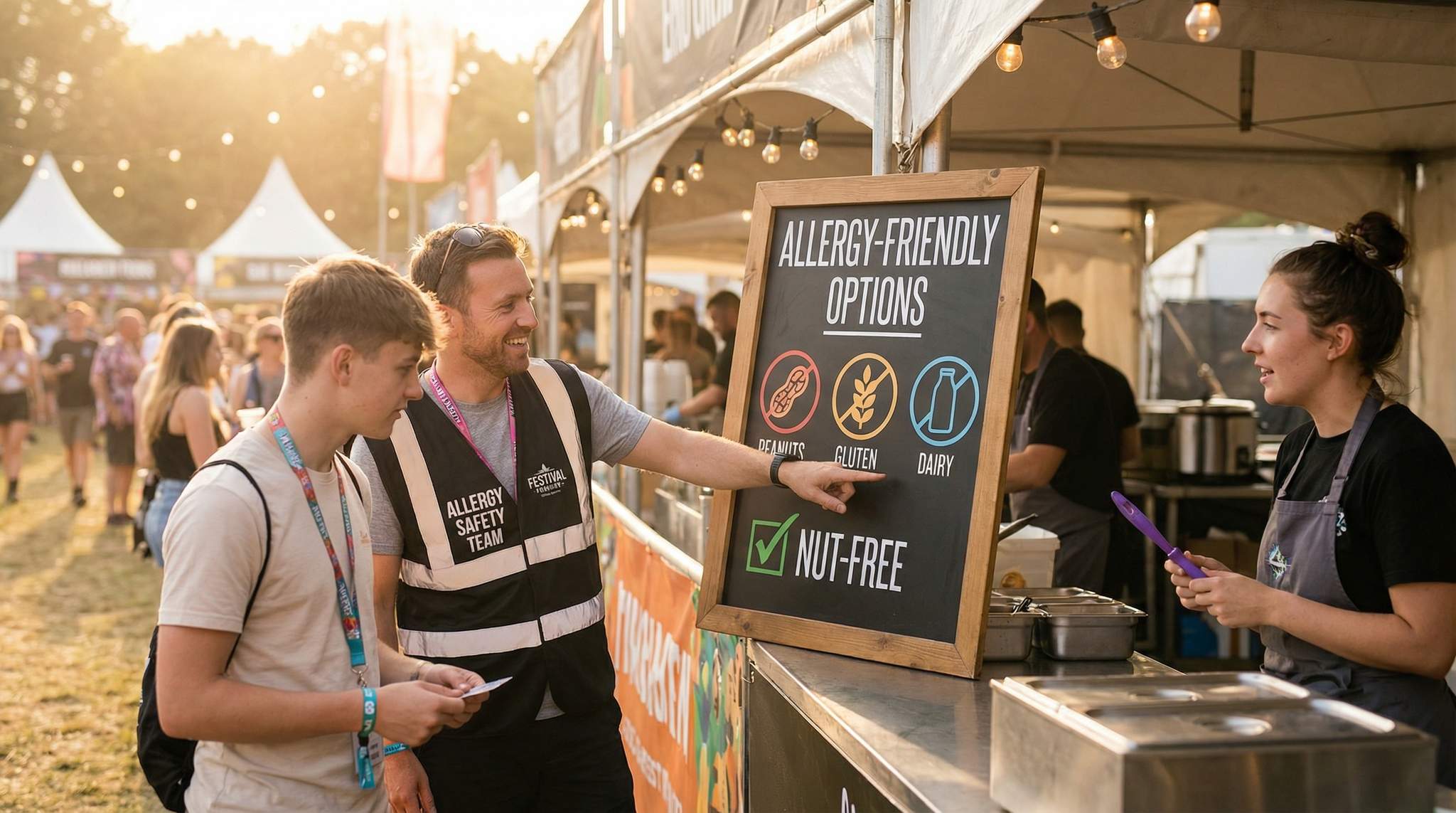Identifying Your Festival’s Core Values and Purpose
Concept and Vision: Setting the Foundation
A festival’s core values and purpose are the compass that guides every decision from conception to execution. When organizers clearly define why the festival exists and what it stands for, it creates a strong foundation for all aspects of planning. This foundation not only helps shape internal decisions but also communicates to everyone—from attendees and artists to sponsors and community partners—exactly what the event is all about.
Understanding Purpose and Core Values
Before diving into logistics and lineup, it’s crucial to articulate the festival’s purpose (its fundamental why) and its core values (the guiding principles and beliefs behind it). The purpose is the festival’s mission or reason for being. For example, a purpose might be “to celebrate local indie music and arts” or “to promote sustainability and eco-conscious living through music and workshops.” Core values, on the other hand, are the key principles that the festival will uphold in pursuing that purpose. These could include things like community, inclusivity, sustainability, creativity, innovation, or cultural heritage.
Why are these important? Clearly defined values and purpose serve as a North Star during planning and production:
– Differentiation: They help your festival stand out in a crowded market by defining its unique character and ethos. Attendees will know what makes your event special.
– Consistency: They ensure all festival elements (from programming and marketing to customer service) deliver a consistent message and experience.
– Motivation: They inspire your team and volunteers by giving deeper meaning to their work. It’s easier to motivate staff around a cause or vision than around just selling tickets.
– Alignment: They keep everyone—from crew to stakeholders—on the same page. When tough decisions arise, referring back to core values can point you in the right direction.
Determining Your Festival’s “Why”
Identifying a festival’s purpose often starts with asking foundational questions:
– What inspired the festival? Perhaps it was a love of a music genre, a cultural movement, or a community need.
– What gap does it fill or what problem does it solve? Maybe your city lacked a platform for local filmmakers, or there was a need for a family-friendly food celebration.
– What impact should the festival have on attendees or the community? Do you want to educate people, unite a community, showcase talent, or drive social change?
– What experience do you want attendees to walk away with? Perhaps a sense of belonging, inspiration, or awareness.
By answering these questions, organizers can craft a clear mission statement for the event. For example, if the inspiration is to support emerging artists, a mission statement might be: “Our festival exists to champion new and diverse artists, providing them a stage and fostering a community that cherishes creativity and originality.” This statement concisely captures the purpose and can be shared with everyone involved.
Pinpointing Core Values
Once the overarching purpose is defined, the next step is to identify 3-5 core values that will guide the festival. It can help to brainstorm with your team or stakeholders by asking:
– What principles are non-negotiable? (e.g., “We will always prioritize sustainability”).
– What qualities do we want our festival to be known for? (e.g., “An inclusive atmosphere where everyone feels welcome.”).
– How do we want to treat our audience, artists, and community? (e.g., “With fairness, respect, and openness.”).
Planning a Festival?
Ticket Fairy's festival ticketing platform handles multi-day passes, RFID wristbands, and complex festival operations.
For instance, a boutique food festival might choose core values like localism (supporting local farmers and chefs), education (teaching attendees about culinary traditions), and hospitality (making every guest feel special). A large music festival might emphasize diversity (of genres and cultures), sustainability, and innovation (in technology and stage design). Write down these values and define them in the context of your event so there’s no ambiguity.
Guiding Decision-Making with Values
Having well-defined core values becomes immensely practical when making decisions. They act as a filter or checklist for whether a choice aligns with what your festival stands for:
– Lineup and Programming: If artistic excellence and diversity are core values, curate a lineup that reflects those ideals (e.g., booking artists from varied backgrounds and genres, or balancing headline stars with up-and-coming talent). If community is a value, you might include local acts or community groups in the program.
– Venue and Sustainability: For a festival that values environmental responsibility, your venue choice and operations will reflect that. You might select a park that allows for green initiatives, enforce a strict leave no trace policy, use renewable energy sources, or ban single-use plastics on site. These decisions might sometimes mean higher costs or extra planning, but they reinforce the festival’s identity and credibility.
– Vendors and Partners: Core values should guide who you partner with. A festival valuing health and wellness might curate food vendors who provide healthy, organic options instead of typical junk food. If inclusivity is a value, ensure accessibility vendors and services (like ADA-compliant facilities, sign language interpreters, gender-neutral restrooms) are part of your plan, and partner with organizations that represent diverse communities.
– Sponsorships: When approached by sponsors, filter opportunities through your values. A sponsor whose image or products clash with your festival’s ethos can confuse your message or alienate your audience. For example, a festival devoted to sustainability might politely turn down a big check from a company known for heavy pollution. On the other hand, aligning with sponsors that share your values (like an eco-friendly brand) can enhance authenticity and audience trust.
– Marketing and Messaging: Your promotional material should echo your core values and purpose. If one of the values is cultural exchange, highlight that in your storytelling—maybe through artist spotlights or community narratives. Consistently weaving the values into marketing ensures that ticket buyers understand the heart of your event from the outset.
Lesson from Experience: Seasoned festival producers have learned that straying from core values can lead to long-term costs. One mid-sized music festival originally built its reputation on an intimate, artist-first experience. When it attempted to rapidly scale up, adding flashy corporate sponsors that didn’t fit its indie spirit, loyal attendees felt betrayed and ticket sales actually dropped the next year. The festival had to regroup and re-align with its original purpose to regain trust. The takeaway: short-term gains are never worth compromising what your festival stands for.
Communicating Values to Stakeholders
Clearly defined values and purpose not only guide internal decisions but also need to be communicated outward to all stakeholders:
– Team and Crew: Make sure your staff, volunteers, and collaborators understand the festival’s mission. Kickoff meetings, training sessions, and production manuals should reiterate these core values. When your team believes in the purpose, they become ambassadors of those values on the ground, providing a cohesive experience.
– Artists and Performers: Communicate your festival’s ethos when booking talent. Artists are more likely to participate (and give memorable performances) when they feel aligned with the event’s spirit. For example, if your festival’s purpose is to champion social justice, artists who share that passion will know this is their kind of event. Some festivals even provide artists with guidelines or welcome packets describing the event’s values (for instance, reminding them of a leave no trace policy or community engagement efforts).
– Sponsors and Partners: When pitching to potential sponsors or collaborating organizations, clearly articulate what your event stands for. This transparency helps attract partners who want to be associated with those values. It also sets expectations that any activation or on-site presence they have should reflect the festival’s standards. A well-aligned sponsor relationship can enhance the festival experience (like a tech company providing free phone charging stations at a tech-friendly music festival), whereas a mismatched one can feel jarring.
– Attendees (Ticket Buyers): Today’s festival-goers are savvy and often choose events that resonate with their personal values. Use your website, social media, and press releases to tell the story of why your festival exists. Share the values through engaging content: blog posts, behind-the-scenes videos, or profiles on how you’re living those values (e.g., spotlight your sustainability efforts or community initiatives). When attendees understand the purpose behind the party, it creates a deeper connection and loyalty. They’ll not only come for the entertainment, but they’ll also support the mission.
– Community and Authorities: Festivals impact their local communities and often require permits and community support. By communicating your purpose (say, revitalizing the local economy or celebrating regional culture), you can gain goodwill. In some cases, involving community leaders or residents in planning, or creating community benefit programs (like donating a portion of proceeds to local charities), reflects your values in action. Authorities are more likely to approve or continue supporting an event that demonstrates positive principles and transparency in its goals.
Living Your Values: Success Stories and Cautionary Tales
Many successful festivals attribute their longevity and loyal fan base to sticking with their core values:
– Burning Man (Nevada, USA): Founded on ten core principles (like radical inclusion, self-reliance, and leave no trace), Burning Man’s entire culture and operations spring from these values. Attendees (“Burners”) know exactly what this event stands for, and that clarity creates a strong, self-policing community. Every decision—from not having on-site commerce to the way art is funded collaboratively—ties back to those guiding principles. The result is a one-of-a-kind experience with a devoted global community.
– Glastonbury Festival (UK): Glastonbury is one of the world’s largest music festivals, yet it has kept a focus on social justice and environmentalism. The festival supports numerous charity partners and has instituted green initiatives (like a plastic bottle ban and extensive recycling programs) because green living is a core value for them. This stance has attracted like-minded festival-goers and artists for decades, reinforcing Glastonbury’s identity beyond just music.
– Local Community Festivals: On a smaller scale, consider a local cultural festival started to preserve heritage (for example, a town’s annual Latin Food & Music Fiesta meant to celebrate Hispanic heritage). Its purpose is community pride and cultural education. By holding true to values of authenticity, education, and inclusivity, it might choose venue locations in historical neighborhoods, involve elders to share stories, and implement ticket discounts for local residents. Such choices ensure the festival genuinely serves its founding purpose. The community will feel it’s their festival, not just another event, which can secure its place as a beloved annual tradition.
– Cautionary Tale – Fyre Festival: In contrast, the infamous Fyre Festival (2017) serves as a lesson in lacking clear values and purpose. Marketed as an ultra-luxury music event in the Bahamas, it promoted an image rather than a mission. With no guiding ethos beyond making money and generating hype, planning decisions spiraled into chaos—basic logistics were neglected and the promises made to attendees and artists rang hollow. The result was a PR disaster and a breach of trust that still haunts the industry. While Fyre is an extreme example of failure, it underscores the importance of building an event on genuine values and a realistic purpose. Festivals cannot succeed on flashy marketing alone; substance and integrity must underpin the vision.
Adapting and Upholding Your Values Over Time
Defining core values is not a one-time task. As your festival grows or evolves, revisit the mission and values periodically:
– Stay Consistent, Yet Flexible: Your core values should be enduring, but the way you implement them might adapt. For example, if innovation is a value, the technologies or ideas you adopt will change over time even though the commitment to innovation remains constant.
– Bring Your Audience Along: If you do refine your purpose, communicate changes to your audience and stakeholders. Transparency builds trust. Maybe your festival started purely as a music event but over time the purpose expanded to include wellness and mindfulness. Explain this evolution and show how it enriches the festival experience rather than contradicts its roots.
– Internal Check-Ins: After each festival edition, debrief with your team about whether decisions and outcomes reflected the stated values. If something felt off (say, a partner activation that didn’t fit the vibe or an attendee complaint that touches on a core value issue), use that feedback to realign next time.
– Lead by Example: Festival leadership should model the values. If respect is a core value, that should be evident in how the production team treats staff, how artists are treated, and how any issues (like refunds or customer service) are handled. Living the values at every level reinforces them more than any written statement can.
Need Festival Funding?
Get the capital you need to book headliners, secure venues, and scale your festival production.
Conclusion: Purpose as Your Guiding Star
Identifying your festival’s core values and purpose is perhaps the most important early step in festival creation. These elements shape the soul of the event. They influence everything—from the vibe on the festival grounds to the stories people tell about it afterward. By taking the time to define what your festival stands for and why it exists, you equip yourself with a clear vision.
That clarity becomes a powerful tool: it guides you through tough decisions, attracts the right audiences and partners, and keeps your festival resilient and focused as it grows. In the words of seasoned festival producers, “When in doubt, look to your core values.” They are the truest compass you have, ensuring that every stage built, every act booked, and every ticket sold contributes to a festival experience with purpose and integrity.
Frequently Asked Questions
What is the difference between a festival’s purpose and its core values?
A festival’s purpose defines its fundamental reason for existence or mission, such as celebrating local indie music. In contrast, core values are the guiding principles and beliefs, like sustainability or inclusivity, that the event upholds while pursuing that mission. Together, they create a foundation for all planning decisions.
Why are core values important for festival planning?
Clearly defined core values serve as a strategic guide that ensures consistency across all festival elements, from programming to customer service. They help differentiate the event in a crowded market, motivate staff by providing deeper meaning, and align stakeholders when making difficult decisions or resolving conflicts.
How can organizers identify a festival’s core values?
Organizers can identify core values by brainstorming with their team to determine 3-5 non-negotiable principles. Key questions include asking what qualities the festival should be known for, such as inclusivity or innovation, and how the event intends to treat its audience, artists, and community.
How do core values influence festival sponsorship decisions?
Core values act as a filter for selecting sponsors, ensuring partnerships align with the festival’s ethos. Organizers should accept opportunities that enhance authenticity, such as an eco-friendly brand for a sustainable event, while rejecting sponsors whose products or image clash with the festival’s message to avoid alienating attendees.
Why should festivals communicate their purpose to attendees?
Communicating a festival’s purpose creates a deeper connection and loyalty among attendees who share those personal values. When ticket buyers understand the specific mission behind the event—whether it is cultural preservation or sustainability—they are more likely to support the vision and engage with the festival beyond just the entertainment.
What are examples of festivals with strong core values?
Burning Man is a prime example, operating on ten principles like radical inclusion and leave no trace that dictate its entire culture. Similarly, Glastonbury Festival prioritizes social justice and environmentalism through charity support and green initiatives. These values attract like-minded communities and define the events’ unique identities.





